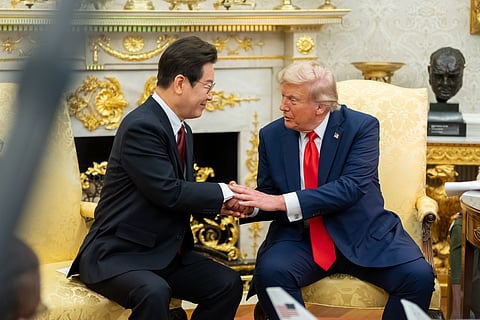

South Korea has firmly rejected U.S. President Donald Trump's insistence on an upfront $350 billion investment as part of a deal to reduce tariffs on its exports.
The statement from a top presidential adviser underscores the growing tensions in negotiations that could otherwise stabilize bilateral trade relations.
The dispute stems from a preliminary agreement reached in July between Trump and South Korean President Lee Jae-myung.
Under that handshake deal, the United States agreed to lower tariffs on South Korean imports from 25 percent to 15 percent.
In exchange, Seoul committed to directing $350 billion toward U.S. projects.
However, the two sides have diverged sharply on the structure and timing of that investment.
South Korea's National Security Adviser Wi Sung-lac addressed the impasse on Saturday during an appearance on Channel A News television.
"The position we're talking about is not a negotiating tactic, but rather, it is objectively and realistically not a level we are able to handle," Wi said.
He emphasized that Seoul cannot meet the demand for an immediate cash outlay, adding, "We are not able to pay $350 billion in cash."
Trump, in remarks on Thursday, highlighted the purported benefits of his tariff policies, stating:
We have in Japan it's $550 billion, South Korea's $350 billion. That's upfront.
This characterization has intensified pressure on South Korea, whose foreign exchange reserves stand at $410 billion.
President Lee Jae-myung warned last week that such a massive upfront payment, absent safeguards like a currency swap, could plunge the nation's economy — Asia's fourth largest — into crisis.
Seoul has proposed alternatives, framing the $350 billion as a mix of loans, loan guarantees, and equity investments rather than direct cash transfers.
It has also resisted U.S. demands for greater control over the funds.
South Korean officials described the talks as deadlocked, with the presidential office affirming earlier this month that it would not rush into an agreement harmful to domestic companies.
Seoul "cannot sign an agreement that would cause major losses to our companies just because of time pressure," the office stated.
As negotiations stall, both sides are eyeing the Asia-Pacific Economic Cooperation (APEC) summit hosted by South Korea next month.
Trump is expected to attend the gathering, providing a potential venue to resolve the deadlock.
Wi indicated that alternative proposals are under active discussion, with Seoul aiming to finalize the trade deal there.
The outcome of these talks holds significant implications for South Korean exporters, who face the risk of reverting to the higher 25 percent tariff without a resolution.
For now, the allies' commitment to collaboration remains, tempered by the hard realities of economic feasibility.